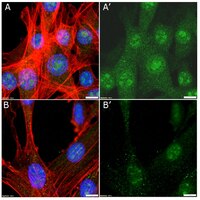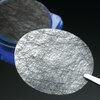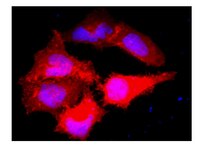Robo2 acts in trans to inhibit Slit-Robo1 repulsion in pre-crossing commissural axons.
Evans, TA; Santiago, C; Arbeille, E; Bashaw, GJ
eLife
4
e08407
2015
Show Abstract
During nervous system development, commissural axons cross the midline despite the presence of repellant ligands. In Drosophila, commissural axons avoid premature responsiveness to the midline repellant Slit by expressing the endosomal sorting receptor Commissureless, which reduces surface expression of the Slit receptor Roundabout1 (Robo1). In this study, we describe a distinct mechanism to inhibit Robo1 repulsion and promote midline crossing, in which Roundabout2 (Robo2) binds to and prevents Robo1 signaling. Unexpectedly, we find that Robo2 is expressed in midline cells during the early stages of commissural axon guidance, and that over-expression of Robo2 can rescue robo2-dependent midline crossing defects non-cell autonomously. We show that the extracellular domains required for binding to Robo1 are also required for Robo2's ability to promote midline crossing, in both gain-of-function and rescue assays. These findings indicate that at least two independent mechanisms to overcome Slit-Robo1 repulsion in pre-crossing commissural axons have evolved in Drosophila. | | 26186094
 |
PAT1 inversely regulates the surface Amyloid Precursor Protein level in mouse primary neurons.
Dilsizoglu Senol, A; Tagliafierro, L; Huguet, L; Gorisse-Hussonnois, L; Chasseigneaux, S; Allinquant, B
BMC neuroscience
16
10
2015
Show Abstract
The amyloid precursor protein (APP) is a key molecule in Alzheimer disease. Its localization at the cell surface can trigger downstream signaling and APP cleavages. APP trafficking to the cell surface in neurons is not clearly understood and may be related to the interactions with its partners. In this respect, by having homologies with kinesin light chain domains and because of its capacity to bind APP, PAT1 represents a good candidate.We observed that PAT1 binds poorly APP at the cell surface of primary cortical neurons contrary to cytoplasmic APP. Using down and up-regulation of PAT1, we observed respectively an increase and decrease of APP at the cell surface. The increase of APP at the cell surface induced by low levels of PAT1 did not trigger cell death signaling.These data suggest that PAT1 slows down APP trafficking to the cell surface in primary cortical neurons. Our results contribute to the elucidation of mechanisms involved in APP trafficking in Alzheimer disease. | | 25880931
 |
Casein kinase 1 regulates sterol regulatory element-binding protein (SREBP) to control sterol homeostasis.
Brookheart, RT; Lee, CY; Espenshade, PJ
The Journal of biological chemistry
289
2725-35
2014
Show Abstract
Sterol homeostasis is tightly controlled by the sterol regulatory element-binding protein (SREBP) transcription factor that is highly conserved from fungi to mammals. In fission yeast, SREBP functions in an oxygen-sensing pathway to promote adaptation to decreased oxygen supply that limits oxygen-dependent sterol synthesis. Low oxygen stimulates proteolytic cleavage of the SREBP homolog Sre1, generating the active transcription factor Sre1N that drives expression of sterol biosynthetic enzymes. In addition, low oxygen increases the stability and DNA binding activity of Sre1N. To identify additional signals controlling Sre1 activity, we conducted a genetic overexpression screen. Here, we describe our isolation and characterization of the casein kinase 1 family member Hhp2 as a novel regulator of Sre1N. Deletion of Hhp2 increases Sre1N protein stability and ergosterol levels in the presence of oxygen. Hhp2-dependent Sre1N degradation by the proteasome requires Hhp2 kinase activity, and Hhp2 binds and phosphorylates Sre1N at specific residues. Our results describe a role for casein kinase 1 as a direct regulator of sterol homeostasis. Given the role of mammalian Hhp2 homologs, casein kinase 1δ and 1ε, in regulation of the circadian clock, these findings may provide a mechanism for coordinating circadian rhythm and lipid metabolism. | | 24327658
 |
Novel mechanism of JNK pathway activation by adenoviral E1A.
Romanov, VS; Brichkina, AI; Morrison, H; Pospelova, TV; Pospelov, VA; Herrlich, P
Oncotarget
5
2176-86
2014
Show Abstract
The adenoviral oncoprotein E1A influences cellular regulation by interacting with a number of cellular proteins. In collaboration with complementary oncogenes, E1A fully transforms primary cells. As part of this action, E1A inhibits transcription of c-Jun:Fos target genes while promoting that of c-Jun:ATF2-dependent genes including jun. Both c-Jun and ATF2 are hyperphosphorylated in response to E1A. In the current study, E1A was fused with the ligand binding domain of the estrogen receptor (E1A-ER) to monitor the immediate effect of E1A activation. With this approach we now show that E1A activates c-Jun N-terminal kinase (JNK), the upstream kinases MKK4 and MKK7, as well as the small GTPase Rac1. Activation of the JNK pathway requires the N-terminal domain of E1A, and, importantly, is independent of transcription. In addition, it requires the presence of ERM proteins. Downregulation of signaling components upstream of JNK inhibits E1A-dependent JNK/c-Jun activation. Taking these findings together, we show that E1A activates the JNK/c-Jun signaling pathway upstream of Rac1 in a transcription-independent manner, demonstrating a novel mechanism of E1A action. | | 24742962
 |
Inhibition of post-translational N-glycosylation by HRD1 that controls the fate of ABCG5/8 transporter.
Suzuki, S; Shuto, T; Sato, T; Kaneko, M; Takada, T; Suico, MA; Cyr, DM; Suzuki, H; Kai, H
Scientific reports
4
4258
2014
Show Abstract
N-glycosylation of proteins in endoplasmic reticulum is critical for protein quality control. We showed here a post-translational N-glycosylation affected by the HRD1 E3 ubiquitin ligase. Both WT- and E3-defective C329S-HRD1 decreased the level of high mannose form of ABCG8, a protein that heterodimerizes with ABCG5 to control sterol balance. Meanwhile, HRD1 increased the non-glycosylated ABCG8 regardless of its E3 activity, thereby suppressing full maturation of ABCG5/8 transporter. Pulse chase and mutational analysis indicated that HRD1 inhibits STT3B-dependent post-translational N-glycosylation of ABCG8. Whereas, HRD1 had only slight effect on the N-glycosylation status of ABCG5; rather it accelerated ABCG5 degradation in an E3 activity-dependent manner. Finally, RMA1, another E3 ubiquitin ligase, accelerated the degradation of both ABCG5 and ABCG8 via E3 activity-dependent manner. HRD1 and RMA1 may therefore be negative regulators of disease-associated transporter ABCG5/ABCG8. The findings also highlight the unexpected E3 activity-independent role of HRD1 in the regulation of N-glycosylation. | | 24584735
 |
Distinct functional domains of the Abelson tyrosine kinase control axon guidance responses to Netrin and Slit to regulate the assembly of neural circuits.
O'Donnell, MP; Bashaw, GJ
Development (Cambridge, England)
140
2724-33
2013
Show Abstract
To develop a functional nervous system, axons must initially navigate through a complex environment, directed by guidance ligands and receptors. These receptors must link to intracellular signaling cascades to direct axon pathfinding decisions. The Abelson tyrosine kinase (Abl) plays a crucial role in multiple Drosophila axon guidance pathways during development, though the mechanism by which Abl elicits a diverse set of guidance outputs is currently unknown. We identified Abl in a genetic screen for genes that contribute to Netrin-dependent axon guidance in midline-crossing (commissural) neurons. We find that Abl interacts both physically and genetically with the Netrin receptor Frazzled, and that disrupting this interaction prevents Abl from promoting midline axon crossing. Moreover, we find that Abl exerts its diverse activities through at least two different mechanisms: (1) a partly kinase-independent, structural function in midline attraction through its C-terminal F-actin binding domain (FABD) and (2) a kinase-dependent inhibition of repulsive guidance pathways that does not require the Abl C terminus. Abl also regulates motor axon pathfinding through a non-overlapping set of functional domains. These results highlight how a multifunctional kinase can trigger diverse axon guidance outcomes through the use of distinct structural motifs. | Immunoprecipitation | 23720041
 |
Mimicking p14ARF phosphorylation influences its ability to restrain cell proliferation.
Vivo, M; Ranieri, M; Sansone, F; Santoriello, C; Calogero, RA; Calabrò, V; Pollice, A; La Mantia, G
PloS one
8
e53631
2013
Show Abstract
The INK4a/ARF locus on the short arm of chromosome 9 is one of the most frequently altered loci in human cancer. It is generally accepted that ARF is involved in oncogenic checkpoint pathways by sensitizing incipient cancer cells to undergo growth arrest or apoptosis through both p53-dependent and independent pathways. While intensive studies have been focused on ARF activation at the transcriptional level, only recently mechanisms governing ARF turnover have been identified. Here, we show for the first time that p14ARF is a PKC target. Prediction analysis showed many potential phosphorylation sites in PKC consensus sequences within ARF protein, and, among them, the threonine at position 8 was the most conserved. Substitution of this threonine influences both ARF stability and localization. Furthermore, a phosphomimetic ARF mutation reduces the ability to arrest cell growth although the ability to bind MDM2 and stabilize p53 result unaffected. Thus we propose that phosphorylation of ARF in both immortalized and tumor cell lines could be a mechanism to escape ARF surveillance following proliferative and oncogenic stress. | | 23308265
 |
The deacetylase Sir2 from the yeast Clavispora lusitaniae lacks the evolutionarily conserved capacity to generate subtelomeric heterochromatin.
Froyd, CA; Kapoor, S; Dietrich, F; Rusche, LN
PLoS genetics
9
e1003935
2013
Show Abstract
Deacetylases of the Sir2 or sirtuin family are thought to regulate life cycle progression and life span in response to nutrient availability. This family has undergone successive rounds of duplication and diversification, enabling the enzymes to perform a wide variety of biological functions. Two evolutionarily conserved functions of yeast Sir2 proteins are the generation of repressive chromatin in subtelomeric domains and the suppression of unbalanced recombination within the tandem rDNA array. Here, we describe the function of the Sir2 ortholog ClHst1 in the yeast Clavispora lusitaniae, an occasional opportunistic pathogen. ClHst1 was localized to the non-transcribed spacer regions of the rDNA repeats and deacetylated histones at these loci, indicating that, like other Sir2 proteins, ClHst1 modulates chromatin structure at the rDNA repeats. However, we found no evidence that ClHst1 associates with subtelomeric regions or impacts gene expression directly. This surprising observation highlights the plasticity of sirtuin function. Related yeast species, including Candida albicans, possess an additional Sir2 family member. Thus, it is likely that the ancestral Candida SIR2/HST1 gene was duplicated and subfunctionalized, such that HST1 retained the capacity to regulate rDNA whereas SIR2 had other functions, perhaps including the generation of subtelomeric chromatin. After subsequent species diversification, the SIR2 paralog was apparently lost in the C. lusitaniae lineage. Thus, C. lusitaniae presents an opportunity to discover how subtelomeric chromatin can be reconfigured. | | 24204326
 |
SGOL1 variant B induces abnormal mitosis and resistance to taxane in non-small cell lung cancers.
Matsuura, S; Kahyo, T; Shinmura, K; Iwaizumi, M; Yamada, H; Funai, K; Kobayashi, J; Tanahashi, M; Niwa, H; Ogawa, H; Takahashi, T; Inui, N; Suda, T; Chida, K; Watanabe, Y; Sugimura, H
Scientific reports
3
3012
2013
Show Abstract
Mitosis is the most conspicuous cell cycle phase and Shugoshin-like 1 (SGOL1) is a key protein in protecting sister chromatids from precocious separation during mitosis. We studied the role of SGOL1 and its splice variants in non-small cell lung cancer (NSCLC) using 82 frozen NSCLC tissue samples. SGOL1-B expression was prevalent in smokers, in cases with a wild-type (WT) EGFR status, and in cases with the focal copy number amplification of genes that are known to be important for defining the biological behaviors of NSCLC. The overexpression of SGOL1-B1 in an NSCLC cell line induced aberrant chromosome missegregation, precociously separated chromatids, and delayed mitotic progression. A higher level of SGOL1-B mRNA was related to taxane resistance, while the forced downregulation of SGOL1-B increased the sensitivity to taxane. These results suggest that the expression of SGOL1-B causes abnormal mitosis and taxane resistance in NSCLC cells. | | 24146025
 |
A role for CF1A 3' end processing complex in promoter-associated transcription.
Al Husini, N; Kudla, P; Ansari, A
PLoS genetics
9
e1003722
2013
Show Abstract
The Cleavage Factor 1A (CF1A) complex, which is required for the termination of transcription in budding yeast, occupies the 3' end of transcriptionally active genes. We recently demonstrated that CF1A subunits also crosslink to the 5' end of genes during transcription. The presence of CF1A complex at the promoter suggested its possible involvement in the initiation/reinitiation of transcription. To check this possibility, we performed transcription run-on assay, RNAP II-density ChIP and strand-specific RT-PCR analysis in a mutant of CF1A subunit Clp1. As expected, RNAP II read through the termination signal in the temperature-sensitive mutant of clp1 at elevated temperature. The transcription readthrough phenotype was accompanied by a decrease in the density of RNAP II in the vicinity of the promoter region. With the exception of TFIIB and TFIIF, the recruitment of the general transcription factors onto the promoter, however, remained unaffected in the clp1 mutant. These results suggest that the CF1A complex affects the recruitment of RNAP II onto the promoter for reinitiation of transcription. Simultaneously, an increase in synthesis of promoter-initiated divergent antisense transcript was observed in the clp1 mutant, thereby implicating CF1A complex in providing directionality to the promoter-bound polymerase. Chromosome Conformation Capture (3C) analysis revealed a physical interaction of the promoter and terminator regions of a gene in the presence of a functional CF1A complex. Gene looping was completely abolished in the clp1 mutant. On the basis of these results, we propose that the CF1A-dependent recruitment of RNAP II onto the promoter for reinitiation and the regulation of directionality of promoter-associated transcription are accomplished through gene looping. | | 23966880
 |

























